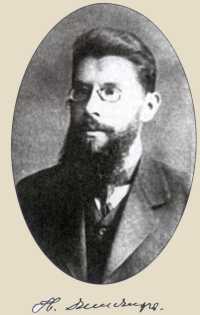Dzhydzhora Ivan
Dzhydzhora Ivan Nikolaevich (Feb 9, 1880 – Apr 24, 1919) – Ukrainian scientist-historian, publicist, journalist.

Ivan was born in a poor peasant family in the village Zastavtsi (now – Pidgajtsi district, Ternopil region). For unknown reasons to school in Buchach he went very late, only in 1895, and finished it in 1902, with 22 years. In the same 1902 he entered the Philosophy Faculty of Lviv University, where he met with Professor Michael Hrushevsky. This meeting was crucial for the future of Dzhydzhora – most of his life he held as a student, a follower and assistant Hrushevsky.
Already in 1904 professor noticed talented student and drew him to work in his informal seminar on the history of Ukraine. The same year dated Dzhydzhora's first published reviews of historical works (he wrote a total of 50 reviews). In the next (1905) year Dzhydzhora visited Kharkiv, where he worked in the archive, and Moscow.
In the archives he collected materials on the theme "Ukraine in times of Hetman Danylo Apostol." This topic was consulted him by Hrushevsky, and all original historical studies Dzhydzhora devoted to it. Also he prepared a collection of documents on the subject, which was not published.
In May 1906 Dzhydzhora began working as a librarian in Shevchenko Scientific Society (head of Society was then Hrushevsky, who tried to financially support his pupil). Apparently, at the same time (2 haalf 1906), he finished his studies at Lviv University.
Since the beginning of 1907 M. Hrushevsky decided to postpone the publication of "Literary and Scientific Bulletin" in Kyiv. The implementation of this decision he put on his disciples of Ivan Krevetski and Ivan Dzhydzhora. In January – September 1907 Dzhydzhora lived in Kiev, engaged in editing and production of the magazine. Then he made his debut as a publicist, publishing articles in newspaper "Rada" and LNV.
In 1908 Dzhydzhora returned to scientific work, made his second archaeographical trip to Moscow (third trip to Kharkov and Moscow – 1910). Based on his collection of manuscript materials wrote a great work "The economic policy of the Russian government against Ukraine in 1710 – 1730"", for which in December 1912 he was awarded the degree of Doctor of Lviv National University.
As they often (unfortunately) occur, after a degree Dzhydzhora stopped scientific work and in 1913 – 1914 appeared in the pages of LNV only as a publicist. During the conflict in 1913 in Shevchenko Scientific Society Dzhydzhora spoke strongly on the side Hrushevsky.
7 Nov 1909 I. Dzhydzhora took marriage with Natalia Navrotska – daughter of priest in Golgochi village (next to the Zastavtsi). They were born daughter Lydia (1910) and son Anatoly (1912).
In 1915 I. Dzhydzhora called to the Austro-Hungarian army. He served in the rear (Lublin). After the proclamation of West Ukrainian People's Republic, in November 1918 he was appointed military commander of the Rava-Ruska. But because of ill in the next month he was forced to leave the service and return to his family in the village Golgochi. There he died Apr 22, 1919.
Portrait of Ivan Dzhydzhora submitted after publication: Correspondence M. Hrushevsky. – Kyiv: 2008, vol. 4, p. 7.
M. Hrushevsky continued to take care of his memory and his family. He initiated publication in 1930 a collection of articles late historian "Ukraine in the first half of the XVIII century." The fee for this publication Hrushevsky sent Natalia Dzhydzhora.
In Soviet times the name Dzhydzhora was quite prohibited – as a student Hrushevsky and as the author, who wrote something critical of Moscow's policy in Ukraine.
Only in 1990, with the beginning of the liberation of Ukraine from Moscow's domination, was discovered and decorated grave historian in Golgochi. To study his personality the most important are articles by V. Przyszlak, but we have no coherent monograph yet. There are stell no reprints of works Dzhydzhora (unless we will post them on this site).
M. Zh., 14 October 2015
